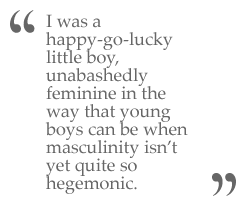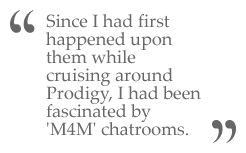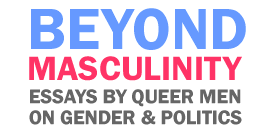|
 y gender has always
been markedly different from most boys I’ve known. Even
when I was eight, I remember being much more content
playing at my friend Becky’s house with her dolls than
playing t-ball with the neighborhood boys. At school, I
was always the proverbial last kid picked for sports. I
didn’t really mind. I hated sports. Nothing scared me
more than a small, spherical object hurling towards my
face. Of course, I kept all of this to myself. Even
then, I knew that others would disapprove of my
not-so-masculine preferences.
y gender has always
been markedly different from most boys I’ve known. Even
when I was eight, I remember being much more content
playing at my friend Becky’s house with her dolls than
playing t-ball with the neighborhood boys. At school, I
was always the proverbial last kid picked for sports. I
didn’t really mind. I hated sports. Nothing scared me
more than a small, spherical object hurling towards my
face. Of course, I kept all of this to myself. Even
then, I knew that others would disapprove of my
not-so-masculine preferences.
After faring well
academically in elementary school, I decided to ship
myself off to an “International Baccalaureate” public
middle school program to further my academic pursuits. I
was, admittedly, a bit of an overachiever. This
accelerated program, almost entirely white, was housed
in a neighborhood school where 99% of the students were
Black. My mother, who taught science at a nearby public
elementary school, dropped me off on her way to work. It
took about 30 minutes to drive from our home in the
wealthy, predominately white suburbs of South Charlotte
to my new school, tucked away in a working class
neighborhood just a few minutes from I-77. Strip clubs
and long-abandoned drive-in movie theatres peppered our
daily commute.
 I was a happy-go-lucky
little boy, unabashedly feminine in the way that young
boys can be when masculinity isn’t yet quite so
hegemonic. I would run and jump and skip on my way to
class, unaware that this was no longer appropriate for
boys in middle school. After a few days of 7th
grade, a few of guys came over, laughing, and asked me
if I could dance for them again. They were referencing
my playful way of skipping and whistling that had become
habit. Sheltered in the suburbs, I had no way to
comprehend my new environment, clouded by racial tension
and a kind of masculinity regimen. Middle school was bad
enough as it was; the stark segregation between the
school’s programs didn’t help matters. I was a happy-go-lucky
little boy, unabashedly feminine in the way that young
boys can be when masculinity isn’t yet quite so
hegemonic. I would run and jump and skip on my way to
class, unaware that this was no longer appropriate for
boys in middle school. After a few days of 7th
grade, a few of guys came over, laughing, and asked me
if I could dance for them again. They were referencing
my playful way of skipping and whistling that had become
habit. Sheltered in the suburbs, I had no way to
comprehend my new environment, clouded by racial tension
and a kind of masculinity regimen. Middle school was bad
enough as it was; the stark segregation between the
school’s programs didn’t help matters.
Not too long after the
dancing debacle, I was crouching down at my locker,
fiddling with my books and deciding whether or not I
needed my protractor, when a class began to file out of
the room to my immediate right. As they began to walk
past me, I heard some of the guys in the group laughing.
I didn’t think anything of it; I had already gotten used
to kids laughing at me – which, in middle school, is
what you assume anyone is doing when they laugh with
your back turned to them. Without warning, one of the
guys kicked me square in the back, knocking the wind out
of me and slamming my forehead against the metal locker.
Shocked, I looked up as the guys were walking away
laughing, mumbling something about “Yea, he’s a total
fag.” Out of what was I’m sure a combination of both
kindness and pity, one of the girls walking behind them
stopped to let me know I had something on my back. It
was a yellow post-it with “Kick me if you think I’m gay”
scribbled on it in black felt-tip ink.
At this time in my young
life, I was a confused conservative child who argued
with his seventh grade English teacher about abortion –
a product of my father’s penchant for Rush Limbaugh. I
didn’t actually understand any of the arguments, but I
was familiar with the talking points. Similarly, I had
heard many people use the word “gay” to describe people,
but I had no way to comprehend what that meant. From
what I had heard on the radio, it seemed that being
“gay” had something to do with having sex with animals,
pedophilia, and generally being morally bankrupt. It
came as something of a surprise then, when I found a
sticker attached to my back that labeled me as such.
I was quite sure that I
wasn’t interested in sex with animals or children. I
did, however, feel a peculiar attraction to other boys.
When I was 12, my mother stumbled across my collection
of steamy man-on-man porn pictures that I had spent
hours downloading and printing out on our home computer
while my parents were out. I kept them stashed in the
lining under my cat’s pink bed. Needless to say, such a
thing is hot when you’re alone in your bunk bed, but
decidedly not when you see it dangling between your
mother’s fingertips. The photos were, shall we say, well
worn. My personal favorite was a picture of a hot
three-way going on in front of a fireplace. All the men
were dripping wet with sweat as they fucked each other
silly. Now, clutched in my mother’s hands, even the
sexiest picture looked dirty and shameful.
 My exploration of the
Internet was not curbed by her unwelcome discovery.
Since I had first happened upon them while cruising
around Prodigy (one of the first dial-up Internet
providers in the US), I had been fascinated by “M4M”
(men for men) chatrooms. I was so fascinated, in fact,
that I had logged countless hours reading the endless
chit-chat that scrolled down the computer monitor. When
two of my friends came over to spend the night, I
decided to divulge to them my experiences with these
strange cyber-rooms filled with mysterious men. Why I
thought it prudent to share with them my curiosity, I’m
not sure. As if discovering my porn collection wasn’t
enough for the mother of a 12-year old to try to wrap
her head around, dear old mom overheard our entire
late-night conversation. When she approached me a few
days later to talk about it, I managed to negotiate my
way out unscathed by telling her that we should simply
cancel the service. Out of sight, out of mind, I hoped.
Confronted with the damning nature of my actions, I was
just as freaked out as she was... (continue reading) My exploration of the
Internet was not curbed by her unwelcome discovery.
Since I had first happened upon them while cruising
around Prodigy (one of the first dial-up Internet
providers in the US), I had been fascinated by “M4M”
(men for men) chatrooms. I was so fascinated, in fact,
that I had logged countless hours reading the endless
chit-chat that scrolled down the computer monitor. When
two of my friends came over to spend the night, I
decided to divulge to them my experiences with these
strange cyber-rooms filled with mysterious men. Why I
thought it prudent to share with them my curiosity, I’m
not sure. As if discovering my porn collection wasn’t
enough for the mother of a 12-year old to try to wrap
her head around, dear old mom overheard our entire
late-night conversation. When she approached me a few
days later to talk about it, I managed to negotiate my
way out unscathed by telling her that we should simply
cancel the service. Out of sight, out of mind, I hoped.
Confronted with the damning nature of my actions, I was
just as freaked out as she was... (continue reading)
|




16 COMMENTS ON THIS ESSAY:
"Gender, at least as it is currently understood, makes free expression nothing short of impossible – for all of us."
WOW!! This line struck me more than anything-- and there was a lot about this essay that I really connected with. I think that even within the gay community, gender plays a terrible constricting role. Your examples of the Boston "bigwigs" who wanted to parade out the "acceptable" homosexuals is one way this plays out within our community.
With this project, and your writing, I'd say you are well on your way toward becoming a role-model and opinion leader for gay men, much in the grain of Eric Rofes. Sullivan, Savage, and the Queer Eye Cast don't got nothing on you, honey!!
Jason -- thank you for your kind words :)
beautiful essay.
I'm an MTF transsexual, and I live in the Philippines, so I can't say that I identify 100% with the experiences that you'e described. Still, the article is touching, and it is scarily illuminating: much of the gay culture that I've come into contact with seems all to eager to shun minorities within the subgroup that are "embarassing" or "contrary to the cause".
I loved it, keep up the good work : )
What you wrote was interesting but I really don't get what you plan on doing with your life. This and trevorhoppe.com seem more like a hobby than anything else. I would assume your are living off of your parents money to fund everything. I don't see what purpose any of this serves. Sure growing up gay is difficult. It's not accepted as normal anywhere in the world. I know it is normal because i'm gay. You have to learn some things on your own.You are feminine and so are a lot of other guys but there is not as far as I know any reason to study it. Thats what gaydar is you can pick out some hint of being feminine. What difference does being gay have to do with anything anyway? It's who you like to be with or have sex with. Try getting a job where you need to work for a year and them write about how a rich kid actually worked for a year. Paris Hilton you aren't.
Trevor,
You have impressed me greatly. Who would have ever thought after our first one or two meetings we'd still be in communication.
Although I know you think I'm the most egocentric person you ever have met, I foresee great promise and future in all of your endeavors.
You're a great man Charlie Brown. Please keep me informed of any and all published work you have forthcoming, I truly enjoy reading it all.
I miss our fights and those long lectures.... Don't tell anyone, but I may not vote R this time...
Hope you and your family are all well.
Much Love,
Burge
This is great, I loved it. It captured something I really regret about my own life - hardening up, developing sharp edges, and feeling ashamed of the gentle self I was as a child.
I'm interested as well by the response of the commenter Jeremy (above, 1 Sep 08), as it reminds me of responses to my own work on sexual racism. It seems quite strained as he labours to construct a class difference he can invoke as a reason to hate 'on' you. He really, really doesn't want anyone to ask these questions, does he? For some, the indeterminacy that we've learned to cherish is a frightening place they're keen to leave as far behind them as possible.
Daniel -- Yes, the comment from Jeremy is disingenuous at best. He makes some big assumptions about me and my life, without hesitation. I guess I never responded out of some shame that I am an academic, and a recognition that that comes out of a place of privilege. I'm not sure when the idea came around that arguments from anyone with privilege are worthless, but its surely pervasive in feminist / queer / anti-academic circles (those are separate but overlapping spheres). But one thing is clear: he had no interest in engaging the arguments, and instead decided to write a hit piece on me. That's all too often how we engage.
Hi Trevor,
That was a very eloquent essay and I was truly touched by it. Although my experiences so far in life have been very different from yours--I'm a young woman who has grown up in very open-minded communities in the North and who now identifies as "interested in people" (what most people would call bisexual)--you articulated a lot of things that have been on my mind recently and that I've discussed and tried to express with my friends. Thank you for giving my feelings words.
I just found this website and I really like the essays and messages. Good luck with everything you do in the future.
Thanks, Tamar! I hope you enjoy the other essays in the collection! And please do spread the word! xoxo
Amongst other things, as someone formally interested in web design, I wanted to say how wonderful the design of this website is. It reminds me of google in its concept- clear, clean, simple, effective, accessable- which makes it all the more beautiful. The one thing I would suggest though is that the essays themselves are inside an iframe, as to reduce loading time.
I have a slightly different interpretation of those days. However, it was interesting to read about how you perceived who I was. Your perception is very valid and made me giggle, though I feel it paints a picture that is not all that close to my actual reality at the time. Not to say that I wasn't going through similar hardship, but I think I was coming from a very different place and I took a very different path. I haven't finished the article, busy trying to memorize music, but I will finish it soon and would like to talk about this later. Cheers!
Paolo
I thoroughly enjoyed this great essay. Perhaps this is a cheap point, but it reminded me of the pain and humiliation individuals face when they fall outside of gender boundaries. It's those individuals I need to be fighting for, even more so than myself.
As an 18-year-old feminine transgender man who's interested in activism and the intersections of oppressions, I'm having a hard time finding inspiring queer male role models who critique society in the way that you do. This site--and your fantastic essay--makes me hopeful. Thank you.
Aw thanks Oliver :) I'm glad you're finding the collection useful! xoxo
Trevor, wonderful piece! You are a brilliant writer with a great voice. I agree with your closing comments that as the more extreme forms of homophobia shift to the background of our culture, they have a disproportionate impact on poorer and more rural gay populations. You are right on in your fear that the big cities may become complacent and less likely to shake the status quo. But why the attacks on Dan Savage and Andrew Sullivan? Aren't they good examples of queer, "out-there" people who are fighting for gay marriage, comprehensive sex education, and acceptance for gay youth via the "It Gets Better Project". I wouldn't paint them with the same heteronormative brush just because they've gone mainstream, they still have a lot to offer to the conversation on gender and sexual equality.
Hey David, thanks for your comment. I've mellowed out a bit politically since writing this piece. But Dan Savage I think has really repugnant politics when it comes to deviant sex, and it frustrates me. The "It Gets Better" campaign was pretty incredible - though I'd like to see half that energy put into actually getting legislation changed. But I understand that cultural campaigns like that can often have powerful effects, sometimes moreso than legal change.
Andrew Sullivan has all but repented for his neoconservative years. The work he's been doing on immigration equality has been tremendous.
Anyways, glad you've enjoyed the piece. Hope you enjoyed other ones here! xoxo